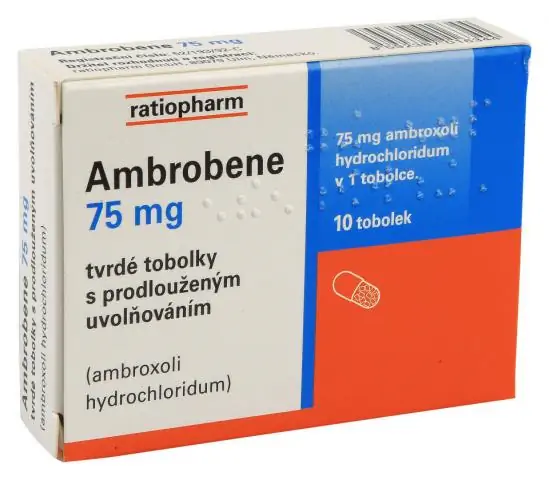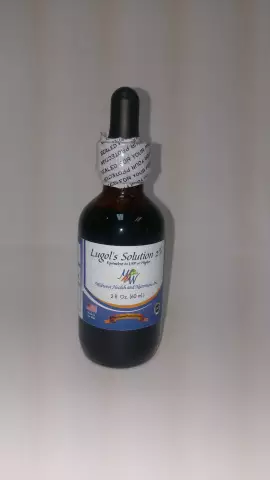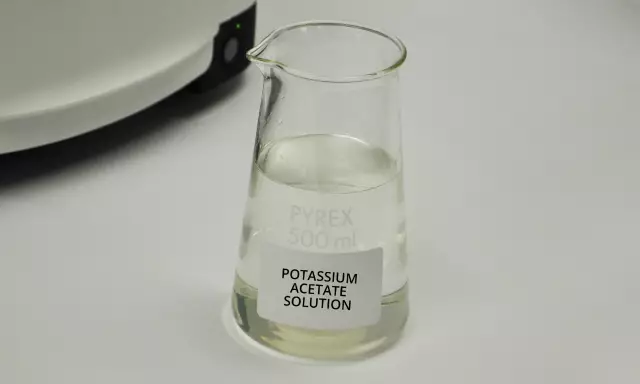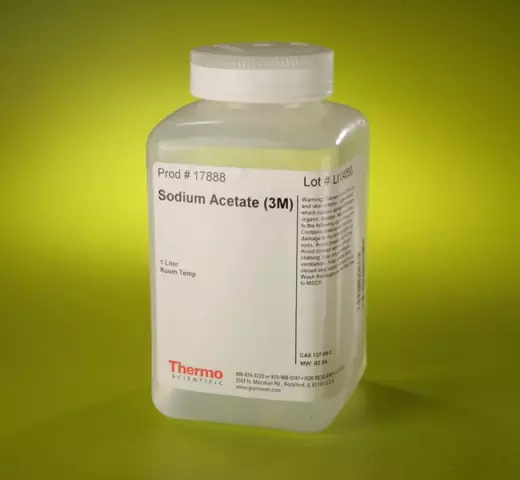- Author Rachel Wainwright wainwright@abchealthonline.com.
- Public 2023-12-15 07:39.
- Last modified 2025-11-02 20:14.
Astrox
Astrox: instructions for use and reviews
- 1. Release form and composition
- 2. Pharmacological properties
- 3. Indications for use
- 4. Contraindications
- 5. Method of application and dosage
- 6. Side effects
- 7. Overdose
- 8. Special instructions
- 9. Application during pregnancy and lactation
- 10. Use in childhood
- 11. In case of impaired renal function
- 12. For violations of liver function
- 13. Use in the elderly
- 14. Drug interactions
- 15. Analogs
- 16. Terms and conditions of storage
- 17. Terms of dispensing from pharmacies
- 18. Reviews
- 19. Price in pharmacies
Latin name: Astrox
ATX code: N07XX
Active ingredient: ethylmethylhydroxypyridine succinate (Ethylmethylhydroxypyridine succinate)
Manufacturer: GosZMP, FGUP (Russia)
Description and photo update: 2019-10-07

Astrox is an antioxidant agent.
Release form and composition
Dosage form - solution for intravenous (i / v) and intramuscular (i / m) administration: transparent, colorless or slightly tinged with a yellowish, brownish-yellowish or reddish tint (2 ml in an ampoule made of light-shielding glass with a dot or break ring, 5 ampoules in a blister contour packaging, in a cardboard box for consumer packaging, 2 packages and instructions for use of Astrox; for hospitals - in a cardboard box of 20, 50 or 100 packages).
Composition of 1 ml solution:
- active substance: ethylmethylhydroxypyridine succinate - 50 mg;
- auxiliary component: water for injection - up to 1 ml.
Pharmacological properties
Pharmacodynamics
Astrox, as an active ingredient, contains ethylmethylhydroxypyridine succinate, a drug belonging to the class of 3-hydroxypyridines that increases stress resistance, has antioxidant, nootropic, anxiolytic, antihypoxic, membrane-protective and anticonvulsant effects.
The drug improves the body's resistance to the effects of the main damaging factors, as well as to oxygen-dependent pathological conditions (cerebrovascular accident, hypoxia, ischemia, shock, intoxication with antipsychotic drugs and alcohol).
Astrox improves microcirculation, blood supply to the brain, cerebral metabolism and rheological properties of blood, reduces platelet aggregation. During hemolysis, it helps to stabilize the membrane structures of blood cells (erythrocytes and platelets). It has hypolipidemic properties, reduces the level of total cholesterol and low density lipoproteins. In acute pancreatitis, it reduces endogenous intoxication and enzymatic toxemia.
The mechanism of action of Astrox is explained by its antioxidant, antihypoxant and membrane-protective properties. Ethylmethylhydroxypyridine succinate inhibits lipid peroxidation processes, reduces membrane viscosity and increases its fluidity, increases superoxide dismutase activity and lipid-protein ratio. It modulates the activity of membrane-bound enzymes (acetylcholinesterase, adenylate cyclase and calcium-independent phosphodiesterase) and receptor complexes (benzodiazepine and acetylcholine, as well as gamma-aminobutyric acid), due to which their ability to bind to ligands is enhanced, the structure of the mediated membranous and functional organization of the biromo-functional organization of biroma
Astrox increases the amount of dopamine in the brain. Under conditions of hypoxia, it enhances the compensatory activity of aerobic glycolysis and reduces the degree of inhibition of oxidative processes in the Krebs cycle, which is accompanied by the activation of energy-synthesizing functions of mitochondria, an increase in the content of creatine phosphate and adenosine triphosphate (ATP), and stabilization of cell membranes.
The drug normalizes metabolic processes in the ischemic myocardium, restores and improves electrical activity and myocardial contractility, reduces the area of necrosis. In acute coronary insufficiency, it improves coronary blood flow in the ischemic zone and reduces the consequences of reperfusion syndrome. Strengthens the antianginal effect of nitrates.
With progressive neuropathy due to chronic ischemia and hypoxia, Astrox helps to preserve optic nerve fibers and retinal ganglion cells. Improves the functional activity of the optic nerve and retina, thereby increasing visual acuity.
Pharmacokinetics
With single and repeated use of Astrox, the pharmacokinetic characteristics of ethylmethylhydroxypyridine succinate do not differ significantly.
After the administration of Astrox at a dose of 400-500 mg, the maximum plasma concentration (C max) is observed in about 0.58 hours and is 3.5-4 μg / ml.
Ethylmethylhydroxypyridine succinate is rapidly distributed in tissues and organs, the retention time of the drug (MRT) is 0.7,31.3 hours. In this case, the drug is rapidly excreted from the plasma and after 4 hours is almost undetectable in it.
The drug is metabolized in the liver by glucuronidation to form various metabolites. Five of them were identified: the first, 3-hydroxypyridine phosphate, is formed in the liver and, under the action of alkaline phosphatase, breaks down in the blood into 3-hydroxypyridine and phosphoric acid; the second - is pharmacologically active, is formed in large quantities, in the first 1-2 days after administration of the drug is found in urine; the third is excreted in large quantities in the urine; the fourth and fifth are glucuron conjugates.
The drug is excreted in the urine unchanged and in the form of glucuron conjugates.
Indications for use
Astrox is used in combination therapy for the following disorders / diseases:
- syndrome of autonomic (neurocirculatory) dystonia;
- anxiety disorders in neurotic and neurosis-like states;
- intellectual and mnestic disorders of various origins (including memory impairments in the elderly);
- acute violation of cerebral circulation;
- discirculatory encephalopathy (including atherosclerotic genesis);
- traumatic brain injury and its consequences;
- primary open-angle glaucoma of various stages;
- acute myocardial infarction (from the first day);
- acute intoxication with antipsychotic drugs;
- alcohol withdrawal syndrome with a predominance of vegetative-vascular and neurosis-like disorders in the clinical picture.
Contraindications
Absolute:
- acute renal / liver dysfunction;
- childhood;
- pregnancy and lactation;
- hypersensitivity to any component of the drug.
In patients with a history of allergic diseases, Astrox should be used with caution.
Astrox, instructions for use: method and dosage
Astrox solution is administered intravenously (drip or jet) and intramuscularly. The drug is administered intravenously in 0.9% sodium chloride solution; drip infusion rate - 40-60 drops / min, duration of jet injection - 5-7 minutes.
Depending on the indication, the maximum daily dose may be 1200 mg.
Recommended dosage regimens:
- acute disorders of cerebral circulation: the first 10-14 days - intravenous drip of 200-500 mg 2 to 4 times a day, in the next 14 days - intramuscularly 200-250 mg 2-3 times a day;
- syndrome of vegetative dystonia, neurotic and neurosis-like states: i.m. dose of 50-400 mg per day for 14 days;
- course prevention of encephalopathy in the stage of decompensation: the first 14 days - intravenous drip or jet, 200-500 mg 1-2 times a day, over the next 14 days - intramuscularly, 100-250 mg per day;
- intellectual-mnestic disorders: i / m, 100-300 mg per day for 14-30 days;
- craniocerebral injuries and their consequences: intravenous drip 200-500 mg 2-4 times a day for 10-15 days;
- open-angle glaucoma of any stage: intramuscularly, 100-300 mg per day (in 1-3 injections) for 14 days;
- acute intoxication with neuroleptics: i.v., 200-500 mg per day for 7-14 days;
- alcohol withdrawal syndrome: intravenous drip or intramuscular injection, 200-500 mg 2-3 times a day for 5-7 days;
- acute myocardial infarction (as part of standard therapy, including the use of nitrates, angiotensin-converting enzyme inhibitors, beta-blockers, anticoagulants, thrombolytics, antiplatelet agents and symptomatic agents if indicated): in the first 5 days it is recommended i / v * administration of Astrox solution to quickly achieve maximum effect, in the next 9 days, you can go to the / m introduction. A single dose is 2-3 mg / kg of body weight (no more than 250 mg), a daily dose is 6-9 mg / kg (no more than 800 mg). The daily dose is divided into 3 administrations at 8 hour intervals.
* Intravenous administration is carried out by slow (in order to avoid the development of side effects) drop infusion, adding the drug to 100-150 ml of 0.9% sodium chloride solution or 5% dextrose (glucose) solution. The duration of the infusion is 30-90 minutes. If necessary, the drug is injected slowly in a stream for at least 5 minutes.
Side effects
- nervous system: drowsiness;
- gastrointestinal tract: dryness of the oral cavity, nausea, diarrhea;
- immune system: allergic reactions.
Overdose
Ethylmethylhydroxypyridine succinate is characterized by low toxicity, so Astrox overdose is unlikely. If the dose is accidentally exceeded, drowsiness may occur, sedation is possible. With the on / in the introduction, there is a slight and short-term (no more than 2 hours) increase in blood pressure.
In most cases, overdose treatment is not required, since the symptoms disappear on their own within 24 hours. If there is a marked increase in blood pressure, antihypertensive drugs may be recommended. For severe insomnia, use nitrazepam (10 mg), diazepam (5 mg), or oxazepam (10 mg).
special instructions
Influence on the ability to drive vehicles and complex mechanisms
Astrox can cause drowsiness, therefore, drivers and persons employed in potentially hazardous industries are advised during the period of therapy to refrain from engaging in potentially hazardous activities that require quick reactions and concentration.
Application during pregnancy and lactation
In the course of experimental studies, no embryotoxic, mutagenic and teratogenic effects were detected in ethylmethylhydroxypyridine succinate. However, adequate and well-controlled studies of the safety of the drug in pregnant and lactating women have not been conducted, therefore Astrox is contraindicated during these periods.
Pediatric use
Until the age of 18, Astrox is contraindicated, since the effect of the drug in patients of this age category has not been sufficiently studied.
With impaired renal function
The pharmacokinetic parameters of ethylmethylhydroxypyridine succinate in acute disorders of renal function have not been precisely established, therefore Astrox is not used in patients of this category.
For violations of liver function
The pharmacokinetic parameters of ethylmethylhydroxypyridine succinate in acute disorders of hepatic function have not been precisely established, therefore Astrox is not used in patients of this category.
Use in the elderly
Astrox is used in elderly people according to indications, including memory impairment.
Drug interactions
Astrox reduces the toxic effects of ethyl alcohol.
Strengthens the action of nitrates, anticonvulsants (carbamazepine), benzodiazepine anxiolytics, antiparkinsonian drugs (levodopa).
Analogs
Astrox analogs are: Medomeksi, Mexidol, Mexicor, Mexiprim, Mexifin, Metostabil, MetucinVel, Neurocard, Neurox, Proinin, Cerecard, etc.
Terms and conditions of storage
Keep out of the reach of children, protected from light, at a temperature not exceeding 25 ° C.
The shelf life is 3 years.
Terms of dispensing from pharmacies
Dispensed by prescription.
Reviews about Astrox
There are practically no reviews on the Astrox on specialized sites. Since the agent is available in the form of a solution for injection, it is used mainly in a hospital setting.
In rare reports, patients who used Astrox for intellectual-mnestic disorders indicate that the course of treatment improves brain function and memory, increases the body's resistance to stress.
Price for Astrox in pharmacies
The approximate price for Astrox (solution for i / v and i / m administration) is 136-148 rubles. for a pack of 10 ampoules of 2 ml.

Anna Kozlova Medical journalist About the author
Education: Rostov State Medical University, specialty "General Medicine".
Information about the drug is generalized, provided for informational purposes only and does not replace the official instructions. Self-medication is hazardous to health!






